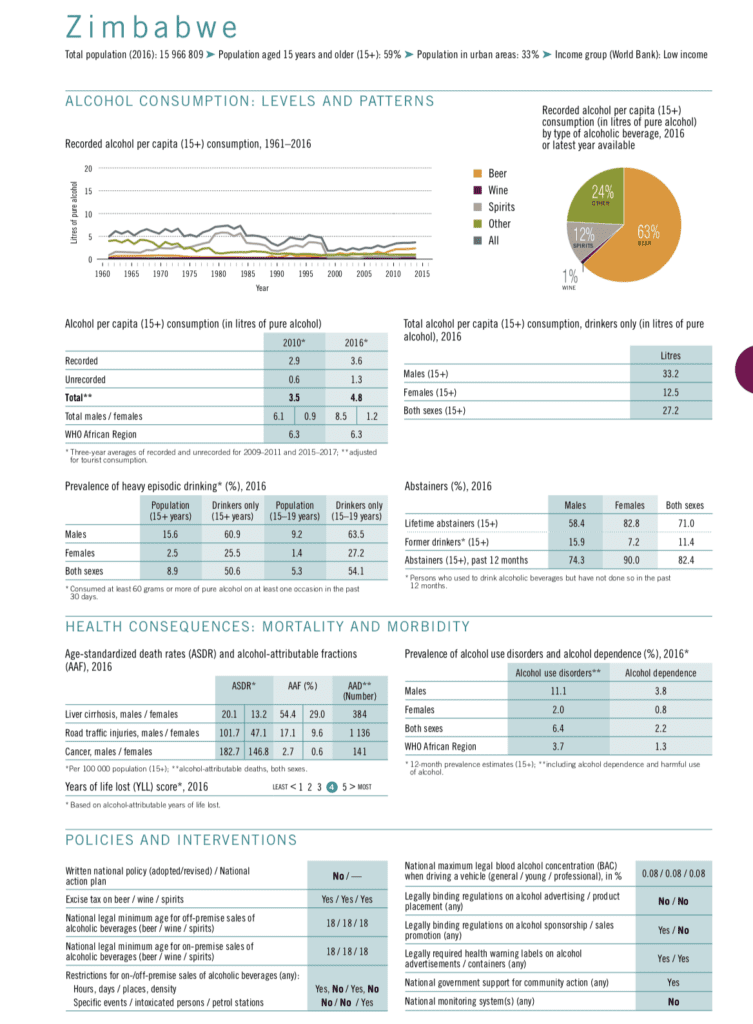As Movendi International previously reported, the NCD Alliance and the SPECTRUM Research Consortium have released a report called “Signalling Virtue, Promoting Harm: Unhealthy commodity industries and COVID-19” exposing how Big Alcohol and other unhealthy industries turned COVID-19 into the world’s largest marketing campaign. The report contained over 360 examples of alcohol industry activities exploiting the public health crisis to pursue profit maximization.
The marketing onslaught seems to have worked for the alcohol industry as alcohol sales have risen across the world, during the pandemic and along with it alcohol harm such as deaths, injury and violence.
Zimbabwe is also facing a rise in alcohol sales. Delta, Zimbabwe’s Big Alcohol giant, recorded a 20% increase in beer sales for the nine months ending September 30, 2020 compared to the same time period in 2019. Sales increased by a massive 48% for the three months ending December 31, 2020 compared to the same time period in 2019.
Delta is owned by SABMiller, now belonging to AB InBev, the world’s largest beer producer.
The sales increases took place while on-premise alcohol outlets such as pubs, bars, and beer halls have been closed. It means people have been consuming more alcohol, alone at home, while in lockdown, which is a concerning trend. The pandemic and resulting consequences such as job loss, full-time caring for children or elderly and isolation has led to an increase is stress, anxiety, loneliness and other mental health problems among Zimbabweans. Alcohol worsens these existing challenges faced by people as it worsens physical and mental health.
A new report illustrate the lethal interaction between alcohol and the coronavirus pandemic, on individual, societal and policy level. The report is showing how alcohol fuels the coronavirus pandemic in different ways, how the alcohol industry exploits the current public health crisis and how many governments around the world have largely failed to protect their people by using evidence-based alcohol policy solutions as part of the response to COVID-19.
Zimbabwe banned alcohol sales temporarily for 30 days on January 9, 2021 along with level four lockdown implementation. This ban applied to supermarket sales of alcohol as well.
Alcohol policy in Zimbabwe

The pandemic has brought into sharp focus the need for a comprehensive alcohol law in Zimbabwe. The government must extend its commitment to alcohol policy beyond the temporary sales ban.
As the World Health Organization (WHO) reports alcohol harm was already a problem and serious obstacle to development for Zimbabwe before the pandemic.
- Over a half (54.1%) of alcohol using youth in Zimbabwe binge on the substance.
- The country is placed on the high end for years of life lost due to alcohol.
- More than 11% of men suffer from an alcohol use disorder.
- While more than 80% of the adult population live free from alcohol, those who consume alcohol – mainly men – have an extremely high per capita alcohol intake (33 liters for Zimbabwean men).
There are many alcohol policy areas that need improvements and overall there needs to be a comprehensive approach developed. For example, regarding alcohol availability, rules for opening hours and legal age limits need to brought to standards of international best practices. Alcohol advertising, promotion and sponsorship should be banned, as is recommended by the World Health Organization.
